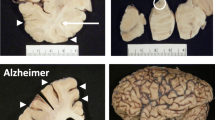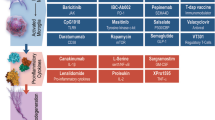Abstract
Arising from C. J. Phiel, C. A. Wilson, V. M.-Y. Lee & P. S. Klein Nature 423, 435–439 (2003)10.1038/nature01640
A major unresolved issue in Alzheimer’s disease is identifying the mechanisms that regulate proteolytic processing of amyloid precursor protein (APP)—glycogen synthase kinase-3 (GSK-3) isozymes are thought to be important in this regulation. Phiel et al.1 proposed that GSK-3α, but not GSK-3β, controls production of amyloid1. We analysed the proteolytic processing of mouse and human APP in mouse brain in vivo in five different genetic and viral models. Our data do not yield evidence for either GSK-3α-mediated or GSK-3β-mediated control of APP processing in brain in vivo.


Similar content being viewed by others
References
Phiel, C. J., Wilson, C. A., Lee, V. M. & Klein, P. S. GSK-3α regulates production of Alzheimer’s disease amyloid-β peptides. Nature 423, 435–439 (2003)
Ishiguro, K. et al. Glycogen synthase kinase 3β is identical to tau protein kinase I generating several epitopes of paired helical filaments. FEBS Lett. 325, 167–172 (1993)
Spittaels, K. et al. GSK3β phosphorylates protein tau and rescues the axonopathy in the central nervous system of human four-repeat tau transgenic mice. J. Biol. Chem. 275, 41340–41349 (2000)
Takashima, A. GSK-3 is essential in the pathogenesis of Alzheimer’s disease. J. Alzheimers Dis. 9 (Suppl.). 309–317 (2006)
Terwel, D. et al. Amyloid activates GSK-3β to aggravate neuronal tauopathy in bigenic mice. Am. J. Pathol. 172, 786–798 (2008)
Kaidanovich-Beilin, O. et al. Abnormalities in brain structure and behavior in GSK-3α mutant mice. Mol Brain. 2, 35 (2009)
Dewachter, I. et al. Neuronal deficiency of presenilin 1 inhibits amyloid plaque formation and corrects hippocampal long-term potentiation but not a cognitive defect of amyloid precursor protein [V717I] transgenic mice. J. Neurosci. 22, 3445–3453 (2002)
Perez-Costas, E., Gandy, J. C., Melendez-Ferro, M., Roberts, R. C. & Bijur, G. N. Light and electron microscopy study of glycogen synthase kinase-3β in the mouse brain. PLoS ONE 5, e8911 (2010)
Jaworski, T. et al. AAV-tau mediates pyramidal neurodegeneration by cell-cycle re-entry without neurofibrillary tangle formation in wild-type mice. PLoS ONE 4, e7280 (2009)
De Strooper, B. et al. Deficiency of presenilin-1 inhibits the normal cleavage of amyloid precursor protein. Nature 391, 387–390 (1998)
Moechars, D. et al. Early phenotypic changes in transgenic mice that overexpress different mutants of amyloid precursor protein in brain. J. Biol. Chem. 274, 6483–6492 (1999)
Tanghe, A. et al. Pathological hallmarks, clinical parallels, and value for drug testing in Alzheimer’s disease of the APP[V717I] London transgenic mouse model. Int. J. Alzheimers Dis. 2010, 417314 (2010)
Jaworski, T. et al. Alzheimer’s disease: old problem, new views from transgenic and viral models. Biochim. Biophys. Acta 1802, 808–818 (2010)
Author information
Authors and Affiliations
Contributions
Generation of transgenic and knockout mice, B.L., D.D., H.D., S.P. and J.R.W.; generation of AAV vectors and intracerebral injections, T.J., D.D. and S.K.; brain analysis, T.J., I.D., B.L., M.G., A.K. and P.B.; design of experiments, data analysis and figures, T.J., I.D., P.B. and F.V.L.; writing of manuscript, T.J. and F.V.L. T.J., I.D. and B.L. contributed equally to this work.
Corresponding author
Ethics declarations
Competing interests
Competing financial interests: declared none.
PowerPoint slides
Rights and permissions
About this article
Cite this article
Jaworski, T., Dewachter, I., Lechat, B. et al. GSK-3α/β kinases and amyloid production in vivo. Nature 480, E4–E5 (2011). https://doi.org/10.1038/nature10615
Received:
Accepted:
Published:
Issue Date:
DOI: https://doi.org/10.1038/nature10615
- Springer Nature Limited
This article is cited by
-
The Amyloid-β Pathway in Alzheimer’s Disease
Molecular Psychiatry (2021)
-
Three-dimensional modeling of human neurodegeneration: brain organoids coming of age
Molecular Psychiatry (2020)
-
Correlation of Dickkopf-1 with Inflammation in Crohn Disease
Indian Pediatrics (2019)
-
GSK3β Controls mTOR and Prosurvival Signaling in Neurons
Molecular Neurobiology (2018)
-
GSK-3β and MMP-9 Cooperate in the Control of Dendritic Spine Morphology
Molecular Neurobiology (2017)





